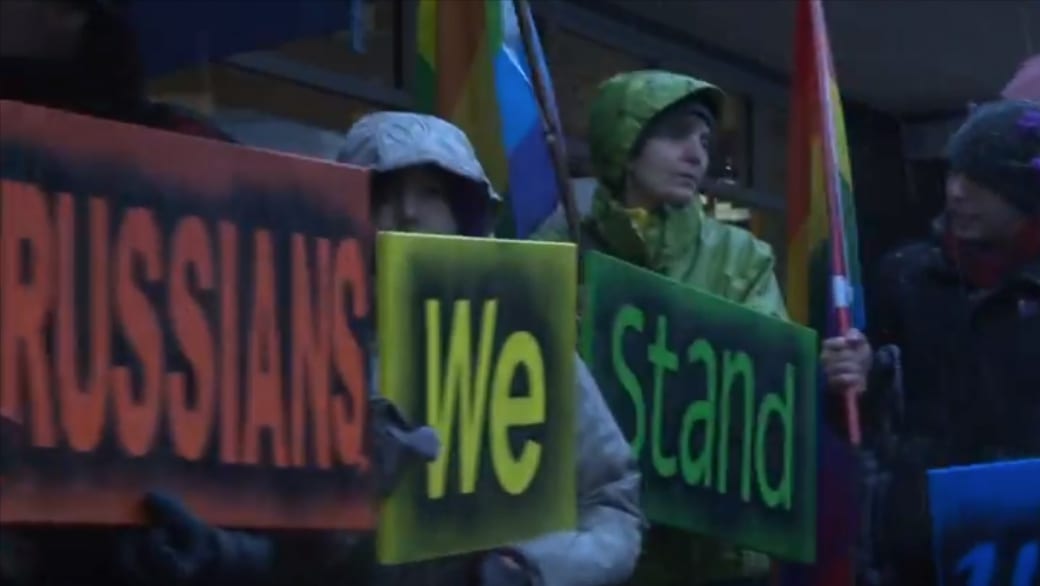A proposed anti-gay bill in Russia is causing concern among LGBT communities worldwide, including in Vancouver. If passed, the bill would penalize members of Russia’s beleaguered LGBT community for any public expression of “personal perverted sexual preferences.” Some say it would make it a crime simply to come out.
“We shouldn’t say, ‘That’s outside our border, we shouldn’t care about it,’” says Zdravko Cimbaljevic, an LGBT activist who sought asylum in Vancouver in 2013, after the government in his country of origin, Montenegro, failed to protect him from death threats and attacks.
Cimbaljevic is now co-organizing a protest in front of Russia’s consulate in Vancouver on Jan 29, 2016.
It’s important for Canadian queers and their allies to show their support for Russia’s queer community and speak out against these laws, he says. It tells Russia’s community “they are not alone.”
“You never know what kind of strength it can give somebody over there,” agrees protest co-organizer Chad Walters.
Walters says a member of Russia’s LGBT community tweeted to thank him after a similar protest 18 months ago.
Seeing LGBT people oppressed in other countries “breaks my heart,” Walters says. He encourages people to get out to the protest, to acknowledge the privilege they enjoy in Canada, and to support those who do not enjoy such freedom.
“It’s hard for me to be complacent when there’s so much backwards movement happening in other parts of the world,” he says.
The latest Russian bill was introduced by two members of the opposition Communist Party in October 2015. Activists are watching Russia’s parliament closely to see if the bill advances. The bill was expected to get a first reading on Jan 22, 2016, but that now seems less likely, since a parliamentary committee responsible for reviewing the bill recommended its rejection.
Still, if the new bill is passed, it could mean kissing or even holding hands would result in a fine, or even a two-week prison sentence if the action takes place near schools or other state offices.
Organizers of the Vancouver protest say it’s important to gather now, whether the bill advances or not.
“This proposed bill was going to make a bad situation worse,” they say on their Facebook event page. Even if the bill fails, it doesn’t mean the situation has improved in Russia, they say. “The anti-propaganda laws and violent anti-LGBT environment still exists.”
Whether it advances or not, activists worry the bill, and the rhetoric surrounding it, could spark a new wave of anti-gay harassment in Russia, like the one following passage of the anti-gay propaganda law in 2013.
When Russian president Vladimir Putin passed the anti-propaganda law — banning any public speeches, writing or demonstrations that youth might see and interpret as equating gay relationships to straight ones — the country saw a wave of violence against gay people.
Cimbaljevic says that result is entirely possible again if the new bill passes. “It will spark anger of the community,” he predicts. “Putin is not backing down.”
Putin’s assertions that he has nothing against the LGBT community are “just stupid,” he adds.
In an explanatory note to the proposed law, its authors contend that homosexuality is “socially infectious,” especially for children and teenagers exposed to public manifestations of homosexuality, says Human Rights Watch in a November 2015 post on its website.
“The authors are using false, abusive, homophobic rhetoric in discussions of their draft law,” Human Rights Watch Russia researcher Tanya Cooper says in the post.
Cooper calls the bill a “new and absurd low in discriminatory legislative proposals.”
Vancouver protest against Russian anti-gay bill
Friday, Jan 29, 2016, 2pm
Russian consulate, 409 Granville St
facebook.com/events/506391552874335/506663269513830/

 Why you can trust Xtra
Why you can trust Xtra


